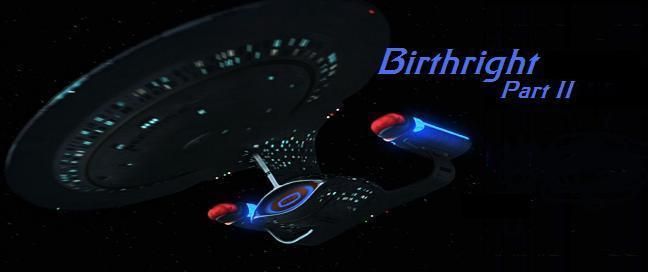
We pick up from where we left-off, Worf has traveled to a prison camp holding survivors from the Romulan attack on the Klingon outpost Khitomer when Worf was a child, Worf has came here on a tip that his birth-father is alive and in the camp. Once in the camp he finds numerous Klingons living there, both young and old, and is informed that his father did, indeed, die at Khitomer.
The attack knocked out several Klingons in the outpost who were taken captive on a Romulan outpost and questioned. When it was determined that they had no information to give up, or were unwilling to do so, the Romulans decided to kill the prisoners. Not understanding Klingon culture allowing this, a Romulan commander crashed his career to oversee the prison camp and allow the captives to live with a measure of freedom.
In the intervening decades a nice-sized community has more or less developed and given birth to a new generation of young people unfamiliar with true Klingon ways, or even that the war is long-since over. Worf shakes things up in the camp, after trying to escape he's recaptured and told that he must stay in the compound where he will retain a measure of freedom if he leaves the camp (as others are allowed) he will be killed.
Worf putters around the camp, but sparks the interest of the native Klingons as he performs his Klingon Tai Chi exercises and his prowess with a spear. He's able to get one of the young people assigned to watch over Worf to go on a hunt with him, where he mentors the young-man in the thrill of the hunt, sparking a life in him he never knew he had.
Worf also develops something of a romantic interest in a young woman he met bathing in a pond but is disgusted to learn she is half-Romulan (her father being the camp's Romulan commander.)
The Romulan commander decides that Worf is proving to be too much of a disruption to their way of life, his inspirations have caused undesired reactions from the young-people. Worf is given the option to either submit to the colony's way of life or be executed. Worf opts for the execution.
Though his love-interest pleads with him to not go with the execution, Worf is content to be a martyr for his ideals and his faces the Romulan fire squad and re-asserts his stance many of the young Klingons, and some of the elders, stand beside him insisting that Worf is killed they will have to be as well. The leader of the Klingons convinces the Romulan commander that the young people given the option to leave the colony if they wish and Worf's life be spared. Worf tells the young people that if they leave they cannot divulge the truth of the camp or their origins in order to preserve the honor of their parents and familial lines.
The Enterprise rendezvous with a Romulan ship carrying Worf and the Klingon youths. Worf informs Picard there were no survivors at Khitomer and that all he found were the survivors of a ship crash. Picard seems to understand what Worf means.
---
Probably the better of this particular two-part set of episodes , though that's not saying a whole heck of a lot to be honest. It is interesting to see how these Klingons and Romulans are living together but I think we could've done with being shown a bit more of a community here or how much more the Romulans and Klingon elders were working together. Instead, it still pretty much feels like a particularly "free" prison. Though the Klingon and Romulan leaders seem to work with one another and respect one another, it still doesn't feel as if it's a completely equal arrangement for both species. Especially since we see armed Romulans walking around.
TNG is bashed a lot for the characters often times being too perfect and too without flaws, here in contrast to that we have Worf's treatment of his mixed-race love interest. He shows actual disgust over her Romulan heritage and uncertainty if he can keep his feelings about her when she has pointed ears.
Worf's taking the young-man on a hunt, recounting the Klingon "biblical" stories and songs are all very interesting in just how much Trek went into over its course setting up the Klingon culture and mythology. The stories Worf often tells of Kahless are in many ways inspiring and well built. Hell, I'll take a Hollywood movie about Kahless and other Klingon Mythology any day over another Hollywood recreation of a Bible story.
The scenes on the Enterprise are too tacked on and just feel too much like probably meeting some quota for the other cast members. The scenes on the ship are pretty much useless. other than the final one in the transporter room.
A meh two-parter, the second half is slightly better mostly in seeing these Klingons and Romulans for a large part living together and seeing some more of Klingon culture but I think more should have been done to show the supposed harmony and good-life the camp had. As remarkable as it is for Klingons and Romulans to be living together it still sort-of felt like a minimum-security prison than it did a revolutionary community.
